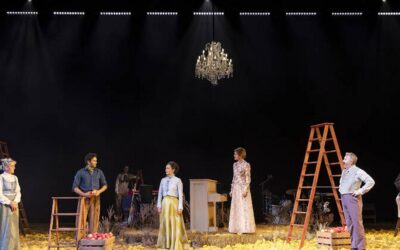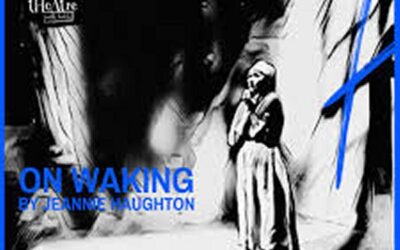By Darby Turnbull
Despite Melina Marchetta being the grand duchess of the scholastic crowd (I have fond Year 6 memories of tearing through my copies of Saving Francesca and On the Jellicoe Road) her seminal classic Looking for Alibrandi had alluded me until last week when I read it in preparation for reviewing this production. Within a page and a half I completely understood its significance and the loyalty it evokes from its readers; set in 1991, it’s a visceral, poignant and unsparingly detailed depiction of 17 year old Josephine (Josie to her loved ones) Alibrandi’s emotional growth over her last year of high school. A third-generation Italian immigrant born to a single mother from a conservative family, a scholarship student at an affluent catholic school; she navigates her own high standards (she aspires to be a Barrister), xenophobic microaggressions, a judgemental community and family who spurned her mother when she became pregnant at 17 and deeply ingrained damaged family dynamics. These all filter her friendships, first romantic relationship, her birth father entering her life and her broadening perspective of her family history and legacy.
It’s impossible to write about this new iteration of this story in a vacuum when the source material looms so large so there’ll be some inevitable compare and contrast but the triumph of writer Vidya Rajan and Director Stephen Nicolazzo, with the resources of Malthouse theatre, is how successfully they’ve adapted the source material to a new medium so that it stands on its own merits whilst capturing a specific essence of Marchetta’s text. They both have very specific tonal energies and it’s a matter of preference which one an audience member might gravitate to. Marchetta’s novel feels incredibly transgressive in the intimacy in which Josie grows into herself and the anger and pain that comes with that. Rajan’s take feels broader and more accessible and the emotional edges hit differently. Adaption is incredibly difficult; one runs the risk of recreating key plot points and losing its soul or taking the key narrative and turning into something that’s a different beast but ultimately unsatisfying when compared to original. Rajan, thankfully avoids both.
One of the key themes of the novel is liberation, emancipation, and freedom; each character is searching for it, reclaiming or remoulding it in a different image. Rajan is in a similar position of having to construct her own text from one so definitive. I was dazzled by how exquisitely crafted Marchetta’s novel was and the nuance in which Josie’s emotional arc was constructed. Rajan has wisely opted not to emulate the structure of the novel; creating a new structure, plot elements are re appropriated, appear in different places, character dynamics have changed. In less skilled hands the narrative would collapse but Rajan’s foundations are strong and evoke a far different energy to the book.
From its opening image Josie’s Nonna Katia (Jennifer Vuletic) dancing alone, emulating a freedom of feeling that she ultimately sacrificed. The first-person narrative of the book means that our perspective is filtered through Josephine and our opinions and worldviews adapt alongside hers. Immediately we, the audience are privy to emotional information that she is yet to receive, and our allegiances are adjusted accordingly. Katia is judgemental, gossipy and often cruel and dismissive of Josie’s mother Christina and Josie’s fierce loyalty to her mother means she often feels an antagonism to her Nonna despite her deep love for her. Whilst Josie still delivers direct asides to the audience, there’s an automatic shift in perspective. Rajan’s sharp and resonant dialogue and stylistic innovations mean that the pace moves crisply through key plot points with sharp emotional landings, but it does mean that there’s a certain restructuring of Josie’s emotional arc. For example, in the novel, she’s significantly more flawed, makes far more mistakes and has more specific consequences for those mistakes than she’s allowed in the play. The reason for this being substantial changes to the supporting relationships in her life; her school rival Poison Ivy has become an amalgamation of several characters so Ivy is now the perpetrator of a particularly vile act of racism and there’s no longer room for a grudging respect to develop between them. Her girlfriend group has been economically reduced to one, Sera who has an entirely different arc in the play and they’re much more equal than they are in the book. Her love interest Jacob Cooke, the passionate rough around the edges, working class school captain has become an almost completely different character and loses some significance as a result. In the novel the two have to overcome a lot to even date for a short period of time, cultural shifts, jealousy, different expectations, some very hurtful arguments. Rajan has simplified their dynamic considerably and as a result they don’t challenge each other as much and don’t feel as integral to the others growth. Within the novel Josie gets called out on her attitude and behaviour far more consistently; her headteacher’s dressing down of her when she’s caught wagging is devastating.

Whether the criticism she receives is always fair is debatable but it’s still vital to her growth as a person.
Rajan however absolutely nails the soul of the novel which is the bond between the three generations of Alibrandi women; Katia, Christina and Josie their scenes together are electric and filled with history; warm, painful and both. Wonderfully Rajan has interspersed the English dialogue with Italian (thankfully there are no subtitles).
Nicolazzo’s passion for the piece is palpable; his bold, stylised production is rich with symbolism but stark enough to allow the actors to give beautifully, distinctive performances full of detail and gravitas. What I admire most in him as a director is his gift for balancing a distinctive style but letting it heighten the emotional substance rather than erase it.
He’s found an excellent design collaborator in Kate Davis; the carpet alone that spans the stage immediately evokes memories of a certain kind of family home. A key moment in the novel is the traditional harvesting of tomatoes and the process of making it into sauce has become the dominating image of the production and it’s a beautiful symbol of both the beauty of tradition but also its claustrophobic restrictiveness. Daniel Nixon’s sound design incorporates a wide range of Italian musical styles from opera to folk perfectly in line with the heightened emotions bubbling beneath and above the exteriors of the characters. Katie Sfetkidis’ lighting design evokes passion, longing and growth. Like all great design and performance, they collaborate beautifully in service of a myriad of moods.
I’ve only known Josie Alibrandi for a week and already I feel like I’d go to bat for her; she’s an adored and iconic character and she’s found her ideal stage representative in Chanella Macri (if there was ever a time to re record the audio book it’s now, but perhaps I’m being too greedy). Every time I’m privileged to see her onstage, I feel my praise for her becomes more heightened; she absolutely nails Josie’s caustic wit, vanity, class resentment, high moral standards and self-doubt. One of the reasons Josie is so adored by the people in her life is that she’s hilarious; whether in showing off her intellect or trading snippy repartee with her loved ones and enemies; Macri has a singular gift for a stroppy aside and the ability to dominate the stage whilst also making herself inconspicuous when she needs to. Most importantly she has the emotional intelligence to convey pages and chapters of emotion with her exquisitely open face. I do hope Rajan’s text becomes a staple of school and community theatre because whilst Macri gives a credible performance as a precocious teenager in this production you never lose (at least I didn’t) yourself to the fact that she’s a fully grown woman, bringing an adult’s perspective. I wouldn’t trade this performance, but I would certainly relish the opportunity to see the rawness of a late adolescent in the part.
John Marc Desengano’s charisma is an invaluable asset in his portrayal of Jacob Coote; making the audience giddily fall for him right alongside Josie. An early speech displays his gift for passionate, rebellious rhetoric that sets him apart from the composed conformity of most of the other boys she knows and his innate sweetness shines through his often-belligerent exterior.

Hannah Monson impresses with some astoundingly quick costume and character changes in her dual roles as Ivy, the rich white school captain and John, Josie’s affluent vulnerable friend John. As Ivy she reeks of entitled disdain and upper class hostility; the script doesn’t give her many opportunities to give Ivy more depth but she makes up for it tenfold in her devastatingly sensitive portrayal of John. She completely disappears into both her roles with a subtle naturalism that contribute to some of the production’s most potent moments.
Ashley Lyons as Michael, Josie’s birth father, quietly shows a later in life coming of age as he connects with the daughter he never knew he had and initially didn’t want. He finds a intricate balance between the ordered, controlled corporate player and the reignition of youthful passion. He’s also able to convey an irresistible sex appeal that adds an electric charge to some of his scenes that don’t include his onstage daughter.
Lucia Mastrantone as Christina, Josie’s mother completely elevates her character to shared protagonist status with Rajan’s thoughtful expansion of her character beyond the developing point of view of Josie. Her diminutive frame shows the weight of a whole lifetime of pain and deferment of validation of it. She’s astounding in her portrait of a woman allowing herself to feel the full extent of her pain after a lifetime of having to be ‘strong’ and a ‘saint’ to be present for her daughter. She’s the kind of everyday heroine that often gets undervalued and her burgeoning ownership of her personhood makes for a truly heartfelt character arc. She also has a mesmerizing turn as Josie’s larger than life friend Sera in another genius piece of doubling emphasizing Christina’s youth as a mother and the occasional blurring of parent and peer dynamics.
Finally there’s Jennifer Vuletic as Katia. Katia is truly the secret weapon of both the book and the play; an endlessly fascinating and contradictory character and her shadow looms large. Vuletic is a bewitching and magnetic stage presence and she’s given some astounding performances in Nicolazzo’s previous work and Katia stands among them, we’re even treated to a sample of her stunning singing voice. During tense confrontations she’s often placed prominently so even when Katia’s actions are having a hurtful effect, we can absolutely see how much pain she’s in herself. She’s coquettish, vain and controlling but her finally giving voice to her trauma and years of unspoken truth are hypnotic.
One thing every actor shares, no matter what character they’re playing is a specific and nuanced sense of shared history and relationship dynamics that feel intimately lived in.

If we’re going to jump on the nostalgia train and return to old properties, we can only be so lucky to have an adaption as clever, funny, heartening and well-crafted as this one. This is a production that envelops its audience into a warm hug and occasionally that’s exactly what we need.
Images: Jeff Busby





